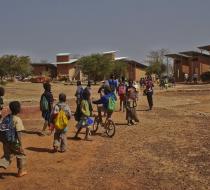Operndorf Afrika Village Favorite
Not far from the Burkina Faso capital of Ouagadougou, approximately 30 kilometers, lies Operndorf Afrika, a village that’s governed by art and a global exchange of culture. An ambitious vision of the late German artist and filmmaker Christoph Schlingensief, the fairly sizeable area found in the West African country since 2010 is home to both local residents and an international artist residency program, where knowledge is transferred between young artists and the village inhabitants over a minimum eight-week period. While roughly translated in English to ‘an opera village in Africa,’ within the confines of the space, no operas have taken place—yet. Instead, the belief in cultural activism and the use of art for development, for all parities, is put into practice.
“It means that art should be based around everyday life of people,” Operndorf Afrika project manager Tatjana Scheikert tells The Creators Project. “And therefore art has the ability to change the lives of people in political or even creative ways. Operndorf Afrika is the belief that every human is creative and should be able to create things. Art is not just the picture on the wall.”
Seen to fruition by Schlingensief’s widow, designer Aino Laberenz, Operndorf Afrika uses art and cultural programming as a starting point to build on education and health sectors for a general public that becomes self-sufficient through the village’s way of life. “After five years we’ve built up a school, a residence centre, artist residency, guest houses and actually, the village is still growing and it should get bigger and bigger,” says Scheikert.
Illiteracy rates in Burkina Faso have been noted as some of the highest in the world, where in 2014 a national education profile by the Education Policy Data Center recorded some 56 per cent of Burkina Faso youth having received no formal education. Teaching strained by a succession of coups—the last change of government occurred in late 2015—Operndorf Afrika’s school has always been the project’s primary focus, offering extended lessons in film, art and music.
“What’s special about the school is that there are more art lessons than in any other school in Burkina Faso,” explains Scheikert. “Through the medium of art, pupils are able to say what they think and which subjects or issues they want to do or discuss.”
Despite the commonly held notion that a Western European project taking place in Africa implies a sort of neo-colonialist endeavour, Operndorf Afrika strives for the exact opposite, using the motto "Learning from Africa" in order to empower an interchange of culture.
“They live art and really see that, through art, you can communicate. I would say that this is something that Europe could learn from,” says Scheikert. “We don’t want to say that the people in Burkina Faso can learn from us, it’s more about what we can learn from them.”
According to The Art Newspaper, with support from the Burkina Faso government and funding from the Goethe Institute, German government, and a slew of individual donors, Operndorf Afrika looks to expand by more than 50 per cent by the end of 2016.
Operndorf Afrika was presented at Frieze London through a multimedia installation, which included Skype interviews with the project’s leaders in Burkina Faso.







